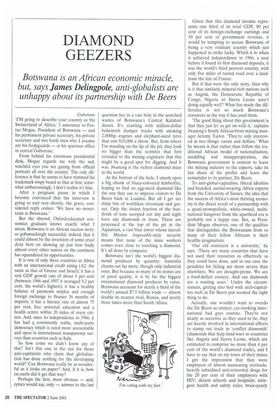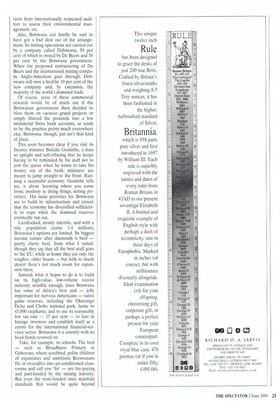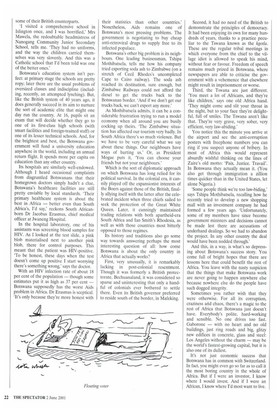DIAMOND GEEZERS
Botswana is an African economic miracle,
but, says James Delingpole, anti-globalists are
unhappy about its partnership with De Beers
Gaborone 'I'M going to describe your country as the Switzerland of Africa,' I announce to Festus Mogae, President of Botswana — and his permanent private secretary, his private secretary and two burly men who I assume are his bodyguards — at his spacious office in central Gaborone.
From behind his enormous presidential desk, Mogae regards me with the sad, watchful eyes you see gazing from official portraits all over the country. The only difference is that he seems to have trimmed his trademark wispy beard so that at first, somewhat embarrassingly, I don't realise it's him.
After a pregnant pause in which I become convinced that the interview is going to end very shortly, the grave, considered reply comes: 'We have no mountains in Botswana.'
But the shrewd, Oxford-educated economics graduate knows exactly what I mean. Botswana is an African success story: so gobsmackingly successful, indeed, that it could almost be the invention of some cruel deity bent on showing up just how badly almost every other nation on the continent has squandered its opportunities.
It is one of only three countries in Africa with an international credit rating (A2, the same as that of Greece and Israel); it has a real GDP growth rate of about 6 per cent (between 1966 and 1997 it averaged 9.2 per cent, the world's highest); it has a healthy balance of payments surplus and enough foreign exchange to finance 36 months of imports; it has a literacy rate of almost 75 per cent, free universal education and a health centre within 20 miles of every citizen. And, since its independence in 1966, it has had ; consistently stable, multi-party democracy which is rated more accountable and open in international transparency surveys than countries such as Italy.
So how come we didn't know any of this? Isn't this one in the eye for those anti-capitalists who claim that globalisation has done nothing for the developing world? Can Botswana really be as wonderful as it looks on paper? And, if it is, how on earth did it get that way?
Perhaps the first, most obvious — and, cynics would say, only — answer to the last question lies in a vast hole in the scorched wastes of Botswana's Central Kalahari desert. It's crawling with million-dollar behemoth dumper trucks with smoking 2,000hp engines and elephant-sized tyres that cost $10,000 a throw. But, from where I'm standing on the lip of the pit, they look no bigger than the termites that first revealed to the mining engineers that this might be a good spot for digging. And it was. Jwaneng is the richest diamond mine in the world.
At the bottom of the hole, I smash open a big chunk of bluey-coloured kimberlite, hoping to find an egg-sized diamond like the one they use to impress visitors to De Beers back in London. But all I get are shiny bits of worthless zirconium and garnet. Only the tiniest fraction of the hundreds of tons scooped out day and night have any diamonds in them. These are processed at the top of the pit in the Aquarium, a vast blue tower whose incredible Mission Impossible-style security means that none of the mine workers comes even close to touching a diamond. It's all done by computer.
Botswana isn't the world's biggest diamond producer by quantity: Australia churns out far more, though only industrial ones. But because so many of its stones are of jewel quality, it is by far the biggest international diamond producer by value. Botswana accounts for nearly a third of the world's annual $7.5 billion trade — almost double its nearest rival, Russia, and nearly three times more than South Africa.
Given that this diamond income represents one third of its total GDP, 80 per cent of its foreign-exchange earnings and 50 per cent of government revenue, it would be tempting to accuse Botswana of being a very ordinary country which just happened to strike lucky. Which it is: when it achieved independence in 1966, a year before it found its first diamond deposits, it was the world's third poorest country, with only five miles of tarred road over a landmass the size of France.
But if that were the only story, then why is it that similarly mineral-rich nations such as Angola, the Democratic Republic of Congo, Nigeria or Sierra Leone aren't doing equally well? What has made the difference is not so much Botswana's resources as the way it has used them.
'The good thing about this government is that they just let us get on with it,' explains Jwaneng's South African-born mining manager Jeremy Taylor. 'They're only interested in two things: carats and dollars.' What he means is that rather than follow the traditional African model of nationalisation, meddling and misappropriation, the Botswana government is content to leave the mining industry to the experts, take its fair share of the profits and leave the remainder to its partner, De Beers.
To anti-global-capitalists, liberal idealists and bearded, sandal-wearing Africa experts from the University of Sussex, the idea that the success of Africa's most thriving economy is the direct result of a partnership with a quasi-monopolistic, white-owned, multinational hangover from the apartheid era is probably not a happy one. But, as President Mogae observes, one of the qualities that distinguishes the Botswanans from so many of their fellow Africans is their healthy pragmatism.
'Our old continent is a university,' he says. 'There are many countries that have not used their resources as effectively as they could have done, and in our case the penalties for failing are more severe than elsewhere. We are drought-prone. We are a food-deficit country. And our diamonds are a wasting asset.' Under the circumstances, getting into bed with arch-capitalists such as De Beers just seemed the right thing to do.
Actually, one wouldn't want to overdo the De Beers as sinister, cat-stroking international bad guys routine. They're not nearly as secretive as they used to be; they are keenly involved in international efforts to stamp out trade in 'conflict diamonds' (diamonds that help fund wars in countries like Angola and Sierra Leone, which are estimated to comprise no more than 4 per cent of the world's diamond trade), and I have to say that on my tours of their mines I got the impression that they were employers of almost nauseating rectitude: heavily subsidised anti-retroviral drugs for the 20 per cent of their employees with HIV; decent schools and hospitals; stringent health and safety rules; twice-yearly visits from internationally respected auditors to assess their environmental management: etc.
Also, Botswana can hardly be said to have got a bad deal out of the arrangement. Its mining operations are carried out by a company called Debswana, 50 per cent of which is owned by De Beers and 50 per cent by the Botswana government. When the proposed restructuring of De Beers and the international mining company Anglo-American goes through, Debswana will own a healthy 10 per cent of the new company and, by extension, the majority of the world's diamond trade.
Of course, none of these commercial rewards would be of much use if the Botswanan government then decided to blow them on vacuous grand projects or simply filtered the proceeds into a few ministerial Swiss bank accounts, as tends to be the practice pretty much everywhere else. Botswana, though, just isn't that kind of place.
This soon becomes clear if you visit its finance minister Baledzi Goalathe, a man so upright and self-effacing that he keeps having to be reminded by his staff not to join the queue when he wants to take his money out of the bank: ministers are meant to jump straight to the front. Running a successful economy, Goalathe tells me, is about 'knowing where you come from; modesty in doing things; setting priorities'. His main priorities for Botswana are to build its infrastructure and ensure that the economy has diversified sufficiently to cope when the diamond reserves eventually run out.
Landlocked, mostly infertile, and with a tiny population (some 1.4 million), Botswana's options are limited. Its biggest income earner after diamonds is beef — pretty chewy beef, from what I tasted, though they say that all the best stuff goes to the EU, while at home they eat only the tougher, older beasts — but with so much desert there's not much room for expansion there.
Instead, what it hopes to do is to build on its high-value, low-volume tourist industry: sensible enough, since Botswana has some of Africa's best and — jolly important for nervous Americans — safest game reserves, including the Okavango Delta and Chobe national park, home to 45,000 elephants; and to use its reasonably low tax rate — 15 per cent — to lure in foreign investors and establish itself as a centre for the international financial-services sector. Botswana is a country with its head firmly screwed on.
Take, for example, its schools. The best — such as Broadhurst Primary in Gaborone, where scrubbed, polite children of expatriates and ambitious Botswanans
file in crocodiles into air-conditioned classrooms and call you 'Sir— are fee-paying
and part-funded by the mining industry. But even the state-funded ones maintain standards that would be quite beyond some of their British counterparts.
'I visited a comprehensive school in Islington once, and I was horrified,' Mrs Mawela, the redoubtable headmistress of Nanogang Community Junior Secondary School, tells me. 'They had no uniforms, and the way the children carried themselves was very slovenly. And this was a Catholic school that I'd been told was one of the better ones.'
Botswana's education system isn't perfect: at primary stage the schools are pretty ropy; later there are the usual problems of oversized classes and indiscipline (including, recently, an attempted lynching). But, like the British system of 40 years ago, it does generally succeed in its aim to nurture the sort of academic elite that might one day run the country. At 16, pupils sit an exam that will decide whether they go to one of its first-class high schools (with smart facilities and foreign-trained staff) or one of its lesser technical schools. And, for the brightest and best, the Botswana government will fund a university education anywhere in the world, including an annual return flight. It spends more per capita on education than any other country.
Its hospitals are similarly well-endowed, Although I heard occasional complaints from disgruntled Botswanans that their homegrown doctors simply hadn't a clue, Botswana's healthcare facilities are still pretty enviable by local standards. 'Their primary healthcare system is about the best in Africa — better even than South Africa's, I'd say,' reckons South Africanborn Dr Jacobus Erasmus, chief medical officer at Jwaneng Hospital.
In the hospital laboratory, one of his assistants was screening blood samples for HIV. As I looked at the test slide, a pink blob materialised next to another pink blob, there for control purposes. This meant that the patient was HIV-positive. 'To be honest, these days when the test doesn't come up positive I start worrying there's something wrong,' says the doctor.
With an HIV infection rate of about 18 per cent of the population — though some estimates put it as high as 37 per cent — Botswana supposedly has the worst Aids problem in Africa. Dr Erasmus is sceptical. 'It's only because they're more honest with their statistics than other countries.' Nonetheless, Aids remains one of Botswana's most pressing problems. The government is negotiating to buy cheap anti-retroviral drugs to supply free to its infected populace.
Botswana's other big problem is its neighbours. One leading businessman, Tshipa Mothibatsela, tells me how his company tried exporting soda ash to Zimbabwe (on a stretch of Cecil Rhodes's uncompleted Cape to Cairo railway). The soda ash reached its destination, sure enough, but Zimbabwe Railways could not afford the diesel to get the trucks back to the Botswanan border. 'And if we don't get our trucks back, we can't export any more.'
As Mothibatsela admits, it can be a considerable frustration trying to run a model economy when all around you are busily cocking up theirs. The Zimbabwe situation has affected our tourism very badly. In South Africa there's so much violence. But we have to be very careful what we say about these things. Our neighbours have ways of hurting us.' Or, as President Mogae puts it, 'You can choose your friends but not your neighbours.'
Which is the sort of diplomatic approach on which Botswana has long relied for its political survival. In the colonial era, it cannily played off the expansionist interests of the Boers against those of the British, finally allying itself with the latter after the celebrated incident when three chiefs sailed to seek the protection of the Great White Queen. Later, it cunningly maintained trading relations with both apartheid-era South Africa and Ian Smith's Rhodesia, as well as with those countries most bitterly opposed to those regimes.
Its history and traditions also go some way towards answering perhaps the most interesting question of all: how come Botswana is about the only country in Africa that actually works?
First, very unusually, it is remarkably lacking in post-colonial resentment. Though it was formerly a British protectorate, Bechuanaland, it was considered so sparse and uninteresting that only a handful of colonials ever bothered to settle there. Even its British governor preferred to reside south of the border, in Mafeking.
Second, it had no need of the British to demonstrate the principles of democracy. It had been enjoying its own for many hundreds of years, thanks to a practice peculiar to the Tswana known as the kgotla. These are the regular tribal meetings in which everyone from the chief to the village idiot is allowed to speak his mind, without fear or favour. Freedom of speech remains much prized in Botswana, where newspapers are able to criticise the government with a vehemence that elsewhere might result in imprisonment or worse.
Third, the Tswana are just different. 'You meet a lot of Africans, and they're like children,' says one old Africa hand. 'They might come and slit your throat in the night, but to your face they're delightful, full of smiles. The Tswana aren't like that. They're very grave, very sober, very efficient, very law-abiding.'
You notice this the minute you arrive at the airport and see the anti-corruption posters with freephone numbers you can ring if you suspect anyone of bribery. In most of Africa this would represent absurdly wishful thinking on the lines of Zaire's old motto: `Paix. Justice. Travail'. In Botswana they actually mean it. (You also get through immigration a zillion times quicker than in the United States, let alone Nigeria.) 'Some people think we're too law-biding,' says Tshipa Mothibatsela, recalling how he recently tried to develop a new shopping mall with an investment company he had formed a few years ago. 'Unfortunately, some of my members have since become government ministers and decisions cannot be made lest there are accusations of underhand dealings. So we had to abandon the project. In any other country the deal would have been nodded through.'
And this, in a way, is what's so depressing about Botswana's success story. You come full of bright hopes that there are lessons here that could benefit the rest of Africa. You leave with the nasty suspicion that the things that make Botswana work are never going to happen anywhere else because nowhere else do the people have such dogged integrity.
Sometimes you rather wish that they were otherwise. For all its corruption, craziness and chaos, there's a magic to the rest of Africa that Botswana just doesn't have. Everybody's polite, hard-working and sensible. No one drives too fast. Gaborone — with no heart and no old buildings, just ring roads and big, glitzy new edifices in concrete, glass and steel: Los Angeles without the charm — may be the world's fastest-growing capital, but it is also one of its dullest.
It's not just economic success that Botswana has in common with Switzerland. In fact, you might even go so far as to call it the most boring country in the whole of Africa. But if I were an investor, I know where I would invest. And if I were an African, I know where I'd most want to live.












































































 Previous page
Previous page